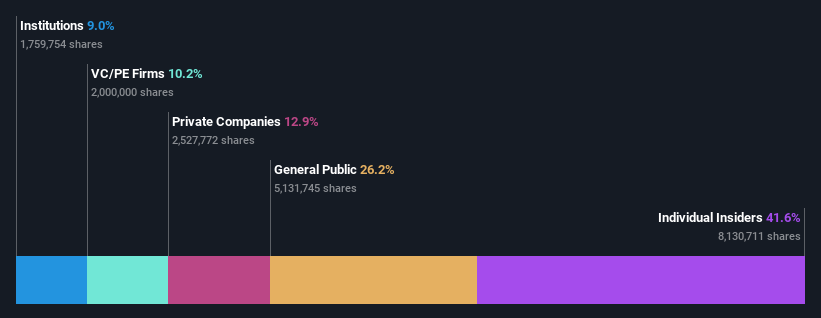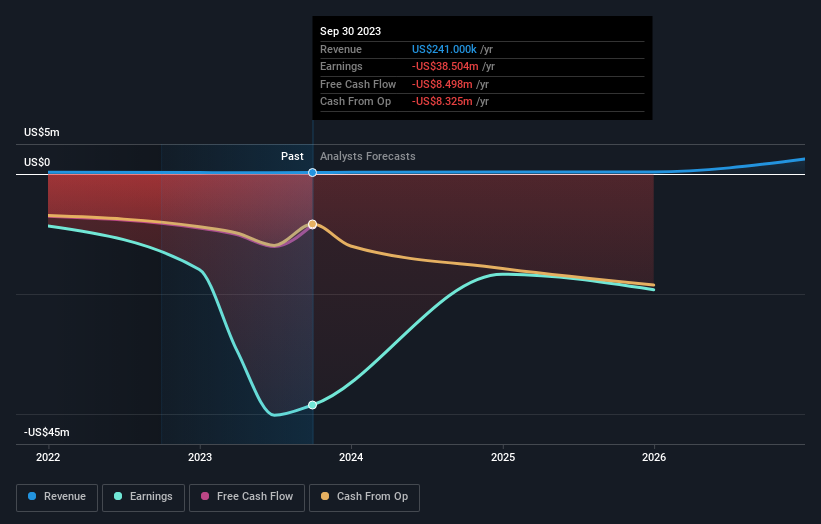- United States
- /
- Medical Equipment
- /
- NasdaqCM:COCH
Insiders with their considerable ownership were the key benefactors as Envoy Medical, Inc. (NASDAQ:COCH) touches US$122m market cap

Key Insights
- Envoy Medical's significant insider ownership suggests inherent interests in company's expansion
- A total of 2 investors have a majority stake in the company with 53% ownership
- Using data from company's past performance alongside ownership research, one can better assess the future performance of a company
A look at the shareholders of Envoy Medical, Inc. (NASDAQ:COCH) can tell us which group is most powerful. The group holding the most number of shares in the company, around 42% to be precise, is individual insiders. Put another way, the group faces the maximum upside potential (or downside risk).
Clearly, insiders benefitted the most after the company's market cap rose by US$98m last week.
Let's delve deeper into each type of owner of Envoy Medical, beginning with the chart below.
View our latest analysis for Envoy Medical

What Does The Institutional Ownership Tell Us About Envoy Medical?
Institutional investors commonly compare their own returns to the returns of a commonly followed index. So they generally do consider buying larger companies that are included in the relevant benchmark index.
Envoy Medical already has institutions on the share registry. Indeed, they own a respectable stake in the company. This implies the analysts working for those institutions have looked at the stock and they like it. But just like anyone else, they could be wrong. When multiple institutions own a stock, there's always a risk that they are in a 'crowded trade'. When such a trade goes wrong, multiple parties may compete to sell stock fast. This risk is higher in a company without a history of growth. You can see Envoy Medical's historic earnings and revenue below, but keep in mind there's always more to the story.

We note that hedge funds don't have a meaningful investment in Envoy Medical. Glen Taylor is currently the company's largest shareholder with 40% of shares outstanding. With 13% and 10% of the shares outstanding respectively, Taylor Sports Group and Anzu Partners, LLC are the second and third largest shareholders. Additionally, the company's CEO Brent Lucas directly holds 0.6% of the total shares outstanding.
A more detailed study of the shareholder registry showed us that 2 of the top shareholders have a considerable amount of ownership in the company, via their 53% stake.
Researching institutional ownership is a good way to gauge and filter a stock's expected performance. The same can be achieved by studying analyst sentiments. While there is some analyst coverage, the company is probably not widely covered. So it could gain more attention, down the track.
Insider Ownership Of Envoy Medical
The definition of an insider can differ slightly between different countries, but members of the board of directors always count. Company management run the business, but the CEO will answer to the board, even if he or she is a member of it.
Insider ownership is positive when it signals leadership are thinking like the true owners of the company. However, high insider ownership can also give immense power to a small group within the company. This can be negative in some circumstances.
It seems insiders own a significant proportion of Envoy Medical, Inc.. It has a market capitalization of just US$122m, and insiders have US$51m worth of shares in their own names. This may suggest that the founders still own a lot of shares. You can click here to see if they have been buying or selling.
General Public Ownership
With a 26% ownership, the general public, mostly comprising of individual investors, have some degree of sway over Envoy Medical. This size of ownership, while considerable, may not be enough to change company policy if the decision is not in sync with other large shareholders.
Private Equity Ownership
With a stake of 10%, private equity firms could influence the Envoy Medical board. Some might like this, because private equity are sometimes activists who hold management accountable. But other times, private equity is selling out, having taking the company public.
Private Company Ownership
We can see that Private Companies own 13%, of the shares on issue. It's hard to draw any conclusions from this fact alone, so its worth looking into who owns those private companies. Sometimes insiders or other related parties have an interest in shares in a public company through a separate private company.
Next Steps:
While it is well worth considering the different groups that own a company, there are other factors that are even more important. To that end, you should learn about the 4 warning signs we've spotted with Envoy Medical (including 3 which are concerning) .
But ultimately it is the future, not the past, that will determine how well the owners of this business will do. Therefore we think it advisable to take a look at this free report showing whether analysts are predicting a brighter future.
NB: Figures in this article are calculated using data from the last twelve months, which refer to the 12-month period ending on the last date of the month the financial statement is dated. This may not be consistent with full year annual report figures.
Valuation is complex, but we're here to simplify it.
Discover if Envoy Medical might be undervalued or overvalued with our detailed analysis, featuring fair value estimates, potential risks, dividends, insider trades, and its financial condition.
Access Free AnalysisHave feedback on this article? Concerned about the content? Get in touch with us directly. Alternatively, email editorial-team (at) simplywallst.com.
This article by Simply Wall St is general in nature. We provide commentary based on historical data and analyst forecasts only using an unbiased methodology and our articles are not intended to be financial advice. It does not constitute a recommendation to buy or sell any stock, and does not take account of your objectives, or your financial situation. We aim to bring you long-term focused analysis driven by fundamental data. Note that our analysis may not factor in the latest price-sensitive company announcements or qualitative material. Simply Wall St has no position in any stocks mentioned.
About NasdaqCM:COCH
Envoy Medical
A hearing health company, focuses on providing medical technologies across the hearing loss spectrum.
Medium-low with limited growth.
Market Insights
Community Narratives




